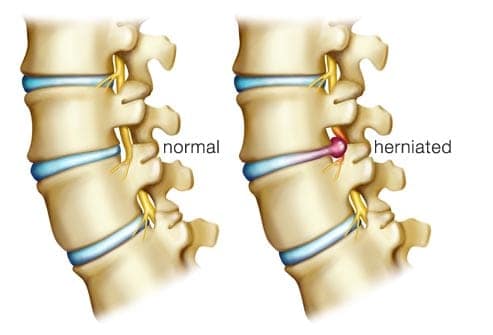Herniated, Ruptured, or Slipped Disk
What is a herniated disk?

A disc, resembling the shape of a doughnut, is a rubbery buffer found amidst each of the singular bones, also known as vertebrae, which constitute your spine. It’s somewhat akin to a jelly doughnut where the core of the disc is enveloped by a harder outer layer. This disc can become herniated, a condition frequently referred to as a “slipped disc” or “ruptured disc”. A herniation happens when a portion of the jelly-like substance protrudes through a rip in the harder exterior.
When a disc becomes herniated, it has the potential to agitate surrounding nerves. This condition often leads to feelings of pain, numbness, or weakness that can spread down the arm or leg, varying according to which disc is affected.
Certain individuals might possess a herniated disc yet not exhibit any symptoms, whereas others might need an operation to mend the herniation.
What causes a disk herniation?
The primary reason for herniation is typically a slow deterioration due to aging, known as disk degeneration. As we age, our spinal disks can lose a portion of their water content, reducing their flexibility and making them susceptible to damage or rupture even from minor strains or twists. This medical condition is referred to as degenerative disk disease, which is an inevitable part of everyone’s aging process.
Another potential factor could be a trauma like a slip and fall or vehicular accident. The force from a car accident, in particular, could lead to a herniated disk, especially if the individual is already at risk of suffering from this condition.
What factors contribute to getting a herniated disk?
Certain factors can heighten your likelihood of experiencing a herniated disk. For example, carrying excess body weight can put additional stress on the disks in your lower back.
The risk can be amplified in physically taxing jobs that require regular lifting, pulling, pushing, or actions involving frequent bending and twisting.
Ultimately, genetics can enhance the risk as certain individuals are genetically predisposed to develop a herniated disk.
What should I do if I think I have a herniated disk?
If your symptoms, such as pain, numbness, or weakness, become so severe that they impair your daily activities, it’s essential to seek emergency medical attention. The same applies if you experience bladder or bowel dysfunctions, like incontinence or difficulty urinating despite having a full bladder. Additionally, you should get immediate medical help if you notice a progressive loss of sensation in areas that would typically touch a saddle – such as your inner thighs, back of your legs, or around the rectum, commonly known as “Saddle Anesthesia.”
To avoid non-trauma-related herniation, ensure you observe proper posture, and engage in exercises that bolster the core muscles, which in turn lend support and stability to the spine, and sustain a healthy body weight.
Should you undergo a distressing event like a car accident, it’s essential to first receive medical care. Subsequently, consider reaching out to a personal injury attorney. They can assist with medical expenses, compensation for lost work time, and property damage.
The Traub Law Office excels at helping our clients who suffered a herniated disk due to trauma. Call us at (512) 246-9191 or complete the contact form if you need our help.

